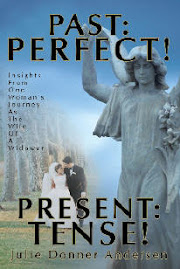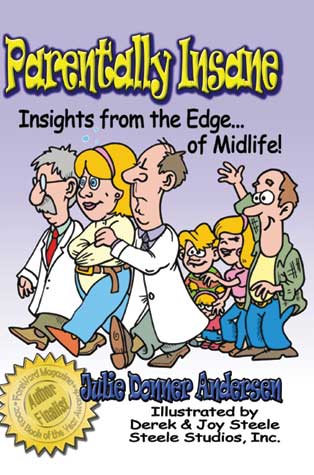As the wife of a former widower, I feel very blessed to be married to a man who knows how to make a marriage work. After all, he has a proven record of commitment. Wives of widowers (or WOWs, as I call them) are also fortunate in another respect: they are married to men who can love with all their hearts because these men know, from experience, that there IS a beautiful rainbow after every dark storm.
A widower is a man who has learned the hard way to embrace life, appreciate all it offers, and live it to the fullest, since he knows life can be short and time is fleeting. In his mind, he had the best marriage once, and he won’t settle for anything less the second time around, either! WOWs should consider themselves complimented!
I am often asked if part of my romantic interest in or attraction to my husband was related to his marital status. Perhaps it did—indirectly. It caused me to be more empathetic early in our relationship, which encouraged our budding friendship to blossom into love. But more often than not, the hidden meaning behind the question is, did I feel that I had something to gain, emotionally speaking, from his being a widower? Yes, and here’s why: My husband’s late wife died of cancer a year after her diagnosis. For a good part of the year prior to her eventual and inevitable death, he was her caretaker. Hollywood enjoys romanticizing this supreme sacrifice by portraying the selfless widower-to-be in movies as his dying spouse’s hero. His nurturing her until her last breath in his arms is both moving and touching, epic in its surrealism and in the emotional payoff at the box office. In reality, my husband did what he felt was appropriate and right as his wife’s husband. He took his “for better or worse, in sickness and in health” marriage vows very seriously. In short, he did what needed to be done, one day at a time, out of love and not to be a hero.
A widower who was his late wife’s caretaker is more often than not a man who has seen the ugly side of life, and still finds life beautiful. He knows what inner strength is all about, has had his resolved tested, and has passed with flying colors. He stands as a true symbol of commitment, for he is honorable in having respected the meaning of the word. He knows there is no obstacle that love and faith cannot overcome, as he makes his way through the valley of the shadow of death and into the light of bereavement recovery.
I believe because my husband lost a wife prior to marrying me, he was changed by the whole experience in many distinct ways. He has learned to be more sacrificing, more appreciative of what he has, and definitely more caring and less selfish. He is also more acutely sensitive to his family’s needs, and has a more profound sense of what “family” is really all about. The experience of loss has taught him that life cannot be taken for granted.
Had he not endured this great loss, perhaps he would be much less introspective, less empathic, less tender, and much more limited in every direction of his emotional spectrum. But now, he has this unbelievably mature perspective that life is all about change, and change equals growth. It’s an ironic truth in life that growth and love come from great pain and tragedy. In other words, how do we define “sweet” if we have never tasted “sour”? Who better than a widower to model this?
Perhaps I would not have been attracted to my husband as the person he was before his late wife passed away, considering how much he HAS grown and changed because of the loss. Those changes are beneficial to both the widower and his second wife because they are what build character traits that help us evolve into two people who are perfect for each other. If the old adage “All things, good and bad, happen for a reason” is true, then perhaps in order for him to be the perfect match for me, he first had to evolve into the man I fell in love with. To do that, he had to go through all the life experiences - the good, the bad, and the ugly - that made him who he is today.
People sometimes ask me, “Would you date a widower again, knowing what you know now about being a WOW?” I always respond positively. Our marriage is not defined by his loss and occasional bouts of sadness relating to grief any more than it is defined by my occasional bouts of feeling that second wife equals second best. We are simply a married couple, comprised of two individuals with unique life experiences. A widower is a good catch for any woman who understands that life is about enjoying the reality of the present and the dreams of the future while not allowing the past to interfere with either.
~~Copyright 2009 Julie Donner Andersen. All rights reserved. Reprints and excerpts only with prior written permission of author.
Subscribe to:
Post Comments (Atom)










I have been a GOW for about a year now. My widower just asked me to marry him from the top of the Empire State building. I am only beginning to discover all the wonderful things in life because of this man. Thanks so much for all your perspectives. I have stuggled with the emotions of being a GOW soon to be WOW and you have truley enlightened me. I am getting ready to order your book. No more comparisons with LW. I'm happier now than I have ever been in my life. Again thanks for being there. Dana
ReplyDeleteAs always, Julie, your words are positive and realistic. I hope never to travel the path of WOW, but of course nobody knows the future and I hope I'll be able to handle it with the grace and compassion that you have.
ReplyDeleteDebbie
A truly beautiful article that clearly captures the MANY positive character traits that result from a man losing his wife. Also appreciate the perspective of a man that actively cares for his wife in her time of greatest need.
ReplyDelete